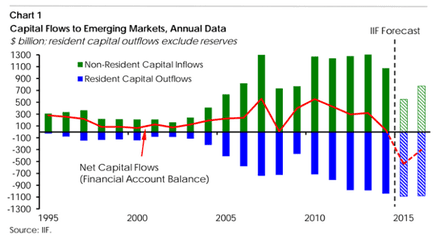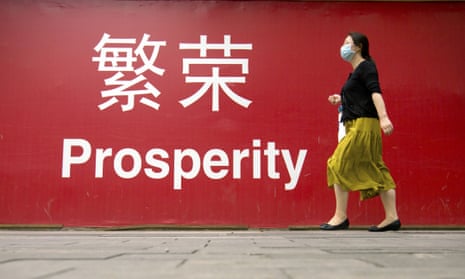Global investors will suck capital out of emerging economies this year for the first time since 1988, as they brace themselves for a Chinese crash, according to the Institute of International Finance.
Capital flooded into promising emerging economies in the years that followed the global financial crisis of 2008-09, as investors bet that rapid expansion in countries such as Turkey and Brazil could help to offset stodgy growth in the debt-burdened US, Europe and Japan.
But with domestic investors in these and other emerging markets squirrelling their money overseas, at the same time as international investors calculate the costs of a sharp downturn in Chinese growth, the IIF, which represents the world’s financial industry, said: “We now expect that net capital flows to emerging markets in 2015 will be negative for the first time since 1988.”

Unlike in 2008-09, when capital flows to emerging markets plunged abruptly as a result of the US sub-prime mortgage crisis, the IIF’s analysts say the current reversal is the latest wave of a homegrown downturn.
“This year’s slowdown represents a marked intensification of trends that have been underway since 2012, making the current episode feel more like a lengthening drought rather than a crisis event,” it says, in its latest monthly report on capital flows.
The IIF expects “only a moderate rebound” in 2016, as expectations for growth in emerging economies remain weak.
Mohamed El-Erian, economic advisor to Allianz, responding to the data, described emerging markets as “completely unhinged”, and warned that US growth may not be enough to rescue the global economy. “It’s not that powerful to pull everybody out,” he told CNBC.
Capital flight from China, where the prospects for growth have deteriorated sharply in recent months, and the authorities’ botched handling of the stock market crash in August undermined confidence in economic management, has been the main driver of the turnaround.
“The slump in private capital inflows is most dramatic for China,” the institute says. “Slowing growth due to excess industrial capacity, correction in the property sector and export weakness, together with monetary easing and the stock market bust have discouraged inflows.”
At the same time, domestic Chinese firms have been cutting back on their borrowing overseas, fearing that they may find themselves exposed if the yuan continues to depreciate, making it harder to repay foreign currency loans.
The IIF’s analysis shows that portfolio flows – sales of emerging market stocks and bonds – have been more important than the reversal of foreign direct investment (for example, multinationals closing down plants or business projects) in the recent shift.
It warns that several countries are likely to find their economies particularly vulnerable to this capital drought.
“Countries most in jeopardy from emerging-market turbulence include those with large current account deficits, questionable macro-policy frameworks, large corporate foreign exchange liabilities, and acute political uncertainties. Brazil and Turkey combine these features.”
This warning echoed a one from the International Monetary Fund last week, that rising US interest rates could unleash a new financial crisis, as firms in emerging economies find themselves unable to service their debts.

Comments (…)
Sign in or create your Guardian account to join the discussion